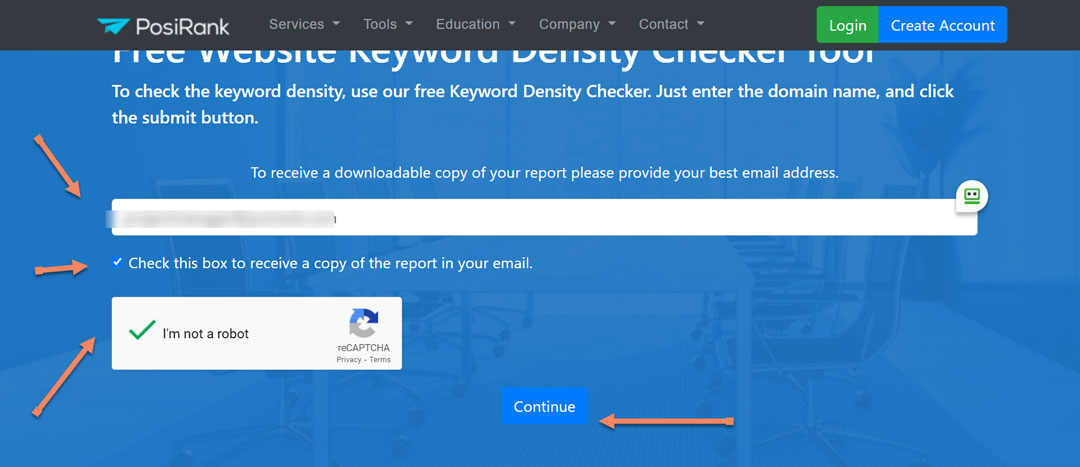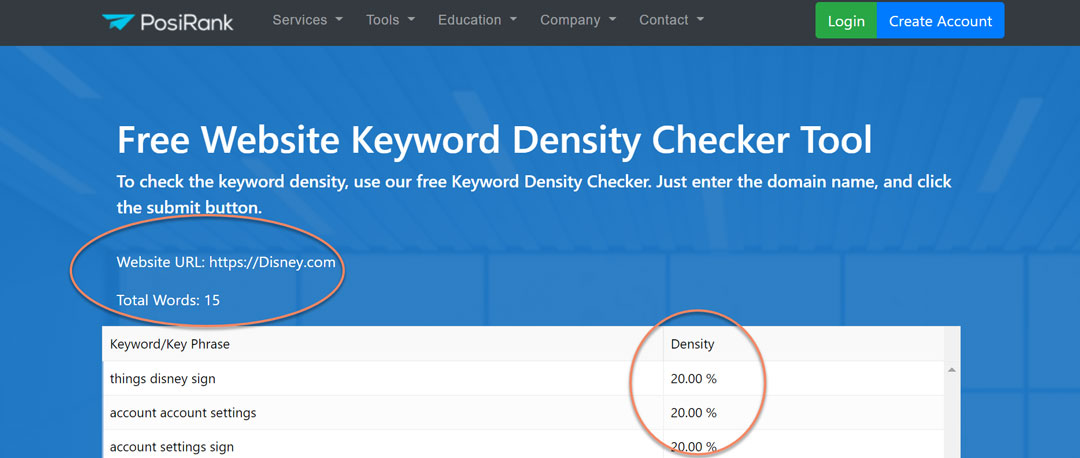Free Website Keyword Density Checker Tool
Just About Everyone Today Has Done An Internet Search.

You type in a phrase, word, question or other information into the search area in your web browser, and results (Search Engine Results Pages or SERPs for short) are returned for you to view. Links to various web pages are displayed for you to investigate.
Basic to the operation of any search engine (the backend code or processing logic used by search engines like Bing, Google, etc.) are three basic tasks:
- A search engine must be able to find new content (in the form of web pages, but also videos, audio podcasts, PDF and other documents) posted and available on the web.
- A search engine must be able to discern what are the topic(s) or subject(s) that this web content/page are about.
- Finally, a search engine must be able to evaluate the relative "value" or relevancy of that web page, relative to the user search parameters (their query) as well as other pages that seem to be dealing with similar topics. Based on that evaluation, the search engine will display results in the SERPs with the most valuable/relevant pages placed higher than links to other pages.
The primary way that search engines find new content is by examining existing web pages that it already knows about for links to pages that it does not know about.
But an important way to "help" search engines understand what your web content deals with is to make sure that key words and concepts are referred to in the wording of that page.
While it's relative importance as a ranking factor has significantly changed (see below), the use of keywords in your page content can still be helpful as long as it is done properly.
What is "Keyword Density?"
"Keyword Density" is just a simple bit of math, nothing more. It is very easy to compute:
- Go through your content and add up each occurrence of a key word or phrase you are aiming to rank for.
- Now calculate the total words used in your content.
- Now for the math: (KW's / Total Words) * 100.
- This will give you a number from 1-100, expressed as a percentage (%). So if your content is 500 words long, and you count 25 instances of your keyword/keyword phrase in that content, your KW density is 4% (20/500=0.04 or 4% (when multiplied by 100).
The notion of keyword density has been around in SEO forever, and is still a concern for many SEOers as they believe that if target keywords are used frequently in their content it will rank better.
Is Keyword Density Still Relevant in SEO?
Which brings us to the heart of the matter: Is KW density still a "thing" in SEO? Does it even really matter? Like many things in the world of SEO, it depends…
If you are thinking in terms of clarifying the intent of your content, keyword density may help search engines to better pigeonhole what your web page is all about.
But if you are still thinking about KW density in terms of influencing rankings in the SERPs, you are just wasting your time:
- First of all, search engines never stated that KW density was a ranking factor in the past. It may have been important back in the early days, when you could zoom web content to the top of the SERPs by stuffing it with keywords. But whatever the power of keyword density to get a page to rank in the past, it has largely lost that power today.
- It is well known search engines today do not place a big value on this (see here and here for comments by Google representatives).
- Over focusing on keyword density can actually harm your web page's ranking. Note this quote from Google's Webmaster Guidelines "Filling pages with keywords…results in a negative user experience, and can harm your site's ranking."
- Current search engine coding takes a more holistic and natural-language approach to evaluate the relevancy and quality of the content on your page, far, far beyond a simple tally of keyword use frequency.
Using the Keyword Density Tool
Using our Keyword Density Tool will give you a basic handle of your web pages keyword use frequency - and it is very easy to use!
Step 1: Input Your Domain Name - Simply type in the domain name of your site:

Step 2: Your Reporting Options and Generating Your Report - Indicate where we should send a link to your downloadable report, check the option box for reporting and fulfill the CAPTCHA:

You then wait for the report to display on your screen:

Note: If you have elected to receive a downloadable report, you will receive an email with a link where you can download your copy to view and retain for your records.
Understanding Your Keyword Density Report
When you look at your results, you will see the page URL you submitted for analysis, along with a list of detected words on the page, and each line in the report shows the specific keyword phrase and its frequency of use, calculated as a percentage of the total page word count.
There is no limit to the number of URLs that you can analyze and of course there is no cost associated with using this tool.
There is More to SEO Than Keyword Density
Beware of those who would like to reduce SEO to a set of formulas, or who suggest that SEO is simply about getting the right data from the right tools. That is part of the equation, but SEO is 3/5 science and data analysis and 2/5 "art." It takes good intuition and plenty of industry experience to know how to get a site ranking improved in the most cost-effective way.
Keyword density is, in fact, a small part of what SEO is all about. Don't rely on amateurs or self-promoting "experts" - your website traffic is too valuable to risk on black-hat or out-of-date thinking. At Posirank, SEO is what we do, 24/7 - and we have been doing it since 2013.
Can we help your site to rank better? Yes - so take a minute to go over to our contact us area and get the process started. It costs you nothing to have a conversation, but you've got to make the first move. Contact us now!